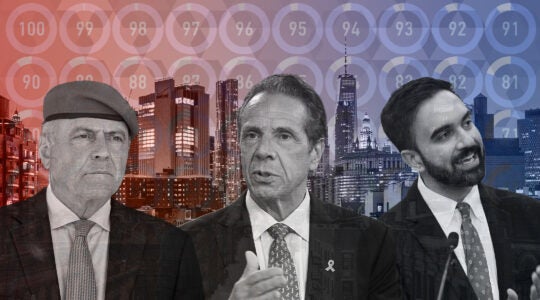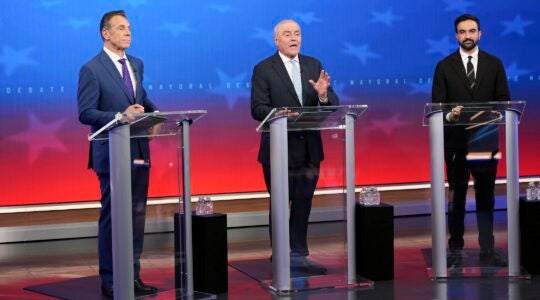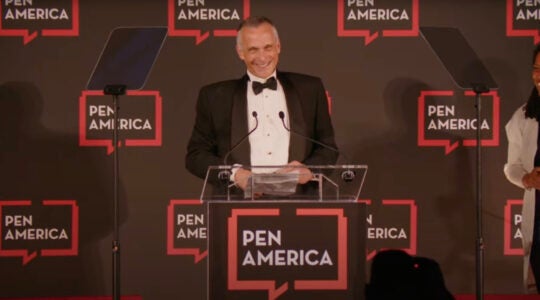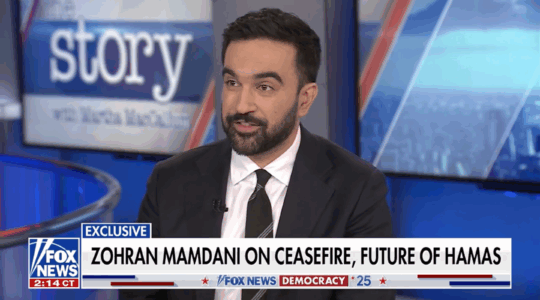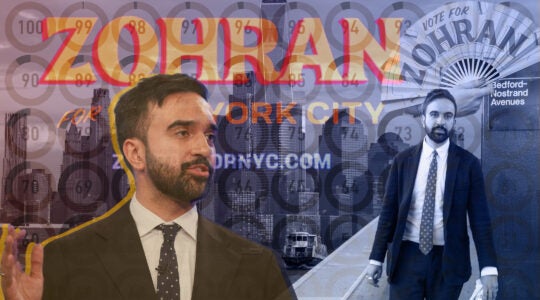WASHINGTON (JTA) — Now that President Obama has held his first meeting with Jewish leaders, the speculation can begin: Which Jewish organization will be the first to land the president as a speaker?
Obama has several options if he wants to speak to a Jewish audience this fall. Already he has received invitations from a partisan organization (the National Jewish Democratic Council); a highly supportive, controversial new dovish group (J Street) and an apolitical broad-based organization (United Jewish Communities).
In reality, according to several people who served as Jewish liaisons in previous administrations, such a decision is often dictated as much by scheduling issues and the president’s message at the time as by the specific character of the groups clamoring for a presidential appearance.
“You want to see what’s on the president’s agenda, what’s driving the message at the White House, and which organization might be a receptive, appropriate audience to carry that message,” said Jay Footlik, the Jewish liaison for President Clinton from 1995 to 1997.
“You want to say yes to everybody, but you can’t,” said Noam Neusner, the Jewish liaison in the George W. Bush administration in 2004-05. So “a lot of it is based on timing and audience value.”
Neusner noted that a third to a half of speaking requests are ruled out because of conflicts with the president’s travel schedule or other commitments.
The issues with which a particular organization is associated also factor into the decision, he said.
If the president wants to speak about church-state issues, for example, he might go to the Anti-Defamation League. The American Jewish Committee could provide the venue for a broad foreign policy address. And if the president wants to talk about the Holocaust, the U.S. Holocaust Memorial Museum or the Simon Wiesenthal Center might serve as good spots.
Of course, personal relationships are always a factor. The fact that its president at the time, Bruce Ramer, was a friend and supporter of George W. Bush helped make the AJC the venue in 2001 for Bush’s first appearance as president at a large Jewish gathering.
World events can sometimes intervene to necessitate a presidential address to a Jewish audience.
Footlik recalled that during a spate of suicide bombings in Israel in 1996, Clinton traveled to the Jewish state and decided as Air Force One was taking off to address the UJC Young Leadership conference, which was meeting that week in Israel.
So, with input from past White House staffers and several more knowledgeable Jewish Washington insiders, here’s a quick guide to handicapping some of the possibilities for Obama’s Jewish debut:
* The National Jewish Democratic Council, a Washington-based organization that helped deliver Obama’s message to the Jewish community during the presidential campaign, has its conference Oct. 20-21. Some observers have speculated that a partisan event, especially one that is likely to be outdrawn by other Jewish organizational gatherings in the coming months, would be an unlikely place for Obama’s Jewish conference debut.
* A week after the NJDC parley, J Street makes its debut on the Jewish conference scene with a Washington event that will bring together 11 other left-wing pro-Israel groups. J Street repeatedly has praised and defended the Obama administration’s Middle East moves, most notably its calls for a settlement freeze. But speaking at J Street would likely generate controversy, since the group has been critical of other Jewish organizations and itself has faced criticism for slamming Israel’s launching of the Gaza invasion.
In addition, one insider noted, the fact that this will be J Street’s first-ever conference means there would be uncertainty on several fronts, including the size of the crowd. Another observer also doubted that the president would attend the J Street parley, and suggested that the better question would be whether the administration would send a high-ranking official in his stead — perhaps a close adviser like White House chief of staff Rahm Emanuel, who is Jewish, or Secretary of State Hillary Rodham Clinton.
* Attending the Union for Reform Judaism biennial convention, which will be held Nov. 4-8, would provide a less controversial option for hooking up with a liberal outfit that supports his vision of a two-state solution and shares his criticism of settlement expansion. In addition, the URJ espouses liberal views on many key domestic issues. And, judging from recent biennials, the crowd will likely top 5,000. The Obama team has tapped the director of the Reform movement’s Washington office several times, including once for a prominent clergy appearance at the Democratic convention. So this would seem to be a good match.
One noteworthy problem that would seem to rule out an Obama appearance — the 2009 biennial is being held in Toronto.
* Perhaps the politically safest option would be the United Jewish Communities General Assembly, the annual gathering of leaders of the North American Jewish federation system, which this year happens to be taking place in the nation’s capital Nov. 8-11.
“It makes perfect sense,” said one knowledgeable observer of the community. “It’s really the biggest Jewish gathering, it’s mainstream, it’s nationwide” and brings together thousands from all along the political spectrum. Another Jewish politico said that given the federation system’s focus on fund raising for Israeli and domestic humanitarian causes, the GA is the sort of venue where the president could get by with generic pro-Israel remarks (i.e. no controversy) and score major points by highlighting various domestic policies.
“He could speak about any subject on the White House agenda” — from health care to volunteerism to caring for the elderly to the economy, the second observer said.
(For those looking to make bets, it also doesn’t hurt that GA co-chair Kenneth Feinberg was recently named the Treasury Department “pay czar” deciding compensation for top executives of companies receiving government assistance.)
A couple of insiders said the president could create his own event to talk to American Jews, scheduling a speech at a synagogue or other Jewish venue. That would allow the White House to have more control over who makes up the audience.
And there’s a final option, which would surprise no one who was interviewed for this story: Obama could skip all the Jewish events this fall and wait until the spring, when he would have AIPAC, the American Jewish Committee, the Anti-Defamation League and the Jewish Council for Public Affairs, among others, from which to choose.
JTA has documented Jewish history in real-time for over a century. Keep our journalism strong by joining us in supporting independent, award-winning reporting.
